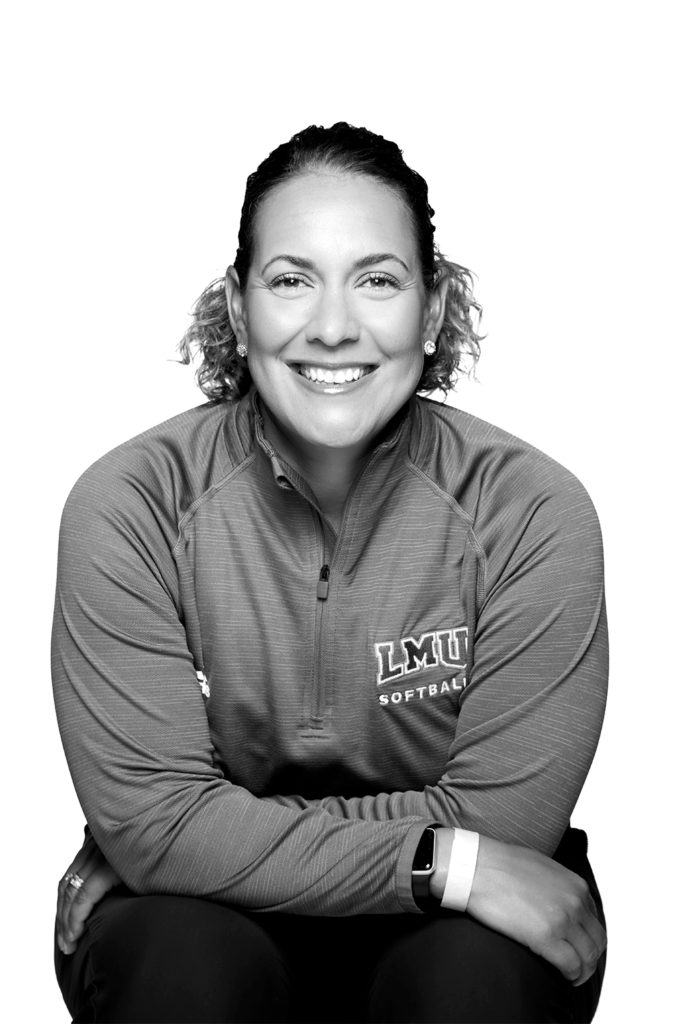
TAIRIA FLOWERS was named LMU softball’s head coach in 2020. Few new hires bring more credentials than Flowers: assistant coach, USA Softball Women’s National Team; member of the U.S. national softball team (2001–08) that earned Olympic gold and silver medals (2004, 2008); two-time All-American and a national championship at UCLA (2003); named to the Pac-12 Conference’s All-Century Softball Team (2016); and Big West Conference Coach of the Year (2015) . We asked Flowers to look back at the 2021 season. She was interviewed by Editor Joseph Wakelee-Lynch.
How were your goals for the first season affected by the pandemic?
To be successful, you’ve got to get to know each other, figure out what motivates everybody and find out their “why.” In a pandemic, you don’t get to have those conversations, interact or create those team-building experiences as much. I would say you have to resort to the CliffsNotes method of getting to know your team. That’s been our mode of operation.
In 2020, the pandemic outbreak halted your CSUN season at mid-point. What lessons did that experience provide when you came to LMU, where you started the job while in the pandemic?
The biggest lesson as a coach, and hopefully for the players, was to not take your time on the field for granted. Coaches told me when I was younger that you never know when your last game is going to be. We had to step into that mind-frame at LMU as well. Enjoying the moment and the opportunity to be together was more of my focus.
During the 2021 season, your team played five games against Pac-12 teams that were ranked in the top five nationally at the time. Are those games a measuring stick of the program, or are they useful in showing you what your players are capable of individually?
It’s a little bit of both. For us to be the best, we have to play against the best. So, we want to figure out where we are on that scale and where we can be better. Any time we step on the field, we remind ourselves that it’s not about the shirts in the other dugout. It’s about whether we can be our best selves right now. Sometimes a team plays to the level of the competition: You play harder against better teams, and sometimes you play down when you don’t. But our goal is to keep a consistent approach whether we’re playing the No. 2 team or No. 300.
You’ve experienced the highest success at every level of the game. Do the personal accomplishments of a coach put her university more on the radar of high-performing student athletes when recruiting?
I’d like to think so. One selling point for us as coaches is that we’ve been where these student athletes are trying to go. We can relate. Mysha Sataraka, my assistant coach, and I can say we also struggled to balance softball and school while trying to be the best. I do think that’s a draw for recruits, and so is being able to say we did that at the highest level. Also, Christian Conrad, our pitching coach, coached at the highest level with the junior national team, and at Florida State and Oregon. We’ve seen [what winning looks like], and that’s what we want to accomplish here. We hope recruits know that that’s what we’re looking for.
What are the most important elements of your LMU pitch to a highly recruited high school player?
We try to keep it pretty simple: what the university offers in terms of class sizes, the degree that recruits are going to get, the location and what we’re trying to accomplish here — a premier program on the West Coast. That’s an easy sell.
Since there are very few professional softball opportunities, what do you want your players to take with them when they walk off Smith Field for the last time?
They should take the work ethic they got from being part of the team and the experience of being leaders and having empowered one another. When they go out in the real world, I want them to realize, as they do on the softball field, how good they are and what they can contribute to future programs, their family and everybody they meet.
What was it like to put on the national shirt for the first time?
That was amazing. On the national team, you’re playing in front of thousands. And you’re their team — it doesn’t matter what university they went to or what state they’re from, you’re their team. Everyone is there to support you. When I heard the crowd chant “USA!” that was just an amazing feeling.
